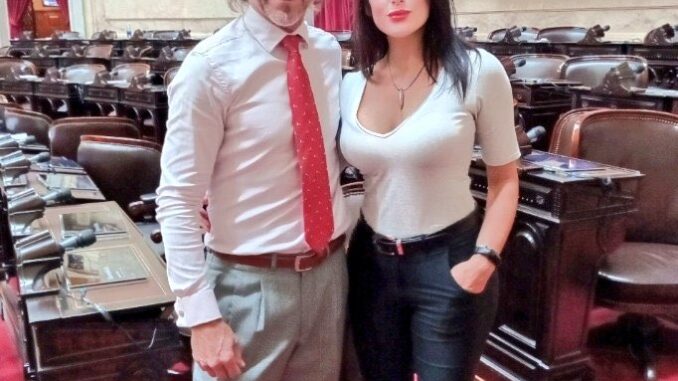
This section examines mechanisms, institutions, sponsors (and some extreme economic effects) of a global network of libertarian think-tanks in Argentina taking a look at their influence on voters in the election of President Javier Milei. It also takes a quick look at some of the impractical and somewhat disastrous economic ideas being peddled and how they got the message across.
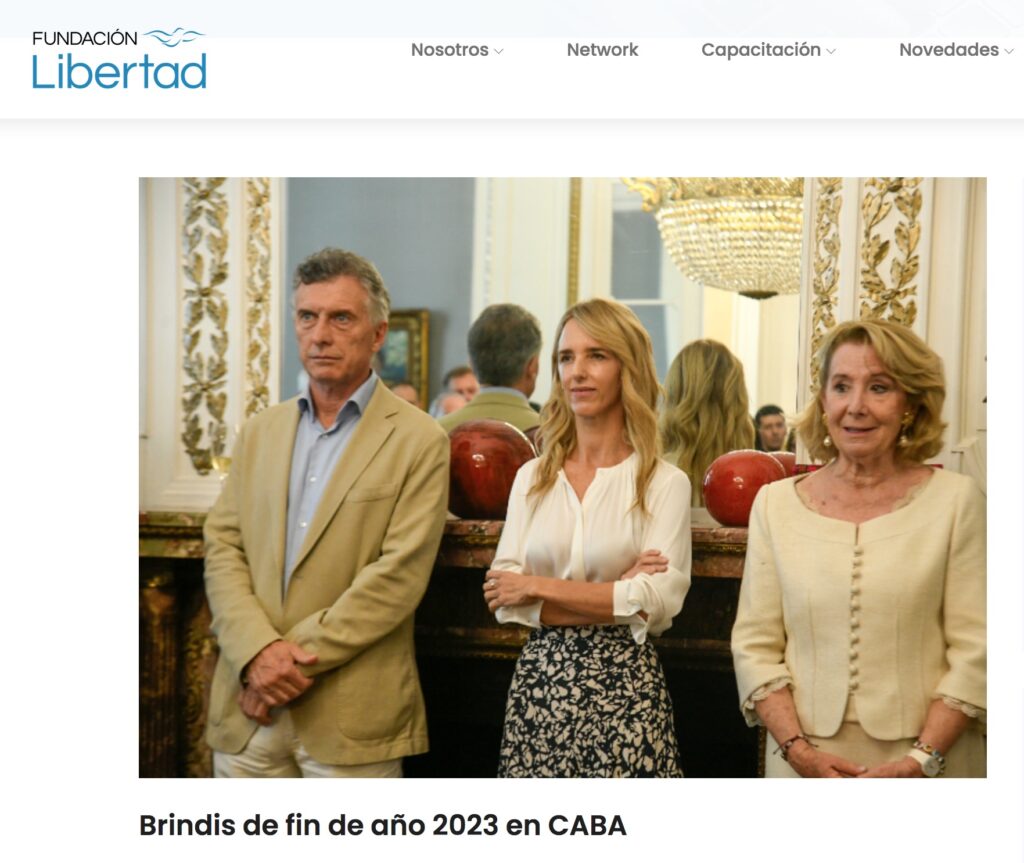
This story begins after The Second World War when Sir Antony George Anson Fisher founded the Institute of Economic Affairs (IEA) a free market think-tank in London. Fisher, heir to a fortune, met Friedrich Hayek who convinced him that he should sell libertarian ideas through think-tanks to counter socialism after the Labour Party took power in post-war elections in Britain. Sir Antony had just read the Reader’s Digest abridged edition of Frederick Hayek’s book “The Road to Serfdom” which Hayek himself described as a political book written by an economist opposed to socialist ideas. The IEA was successful, it still is, and Sir Antony went on to found many more similar think-tanks and then networked these under The Atlas Foundation[1] now headquartered in Arlington Virginia, near Washington D.C.. Our journey ends with the election of Milei and a celebration organized in Buenos Aires by the Fundación Libertad with headquarters in Rosario, Santa Fe Province, Argentina connected with Atlas via local networks in Red Liberal de América Latina (RELIAL) in Mexico city and a quick stop for a little extra doctrinal sauce at Libertad y Progreso in the Argentine capital, Buenos Aires. The reason that the Fundación Libertad is in Rosario is because that is where Milei’s Benegas Lynch blue-blood dignitary backers hang out. Three generations back Albert Benegas Lynch brought Liberalism to Argentina; he literally invited Mises and Hayek to visit with his own cash, he was a big fan. Then his son (now 83 years old) also a gigantic fan of libertarianism, Dr. Econ. Alberto Benegas Lynch (Jr.) is a council member of the (Fisher-founded) IEA and now Junior’s son, Berty Benegas Lynch (yes I know…) is in Milei’s Liberal Government in Buenos Aires. Small World, huh?
First we shall take a look at what the rich backers of these institutions want, who they are and the companies who fund these think-tanks so as to benefit from the ideas they spread.
Argentina, The Dual Class System
Argentina has a class issue, one class tries to hide it’s existence from the public. The Spanish phrase for this invisible class is la clase dirigente, it translates loosely to the ruling or the upper class or the management class. Whatever term is used, they do exist and they’re extremely rich and powerful. In terms of wealth South America is one of the most unequal region on the planet, the African continent is just a little worse, which basically means the local upper classes own almost everything. Being labelled upper class publicly can have some negative connotations. Argentina is a state with a history of extreme violence. Fame can make one’s family a target for theft or kidnapping, worse still it might attract the attention of Argentina’s notorious paparazzi ‘journalism’, or even have one investigated by tax authorities.
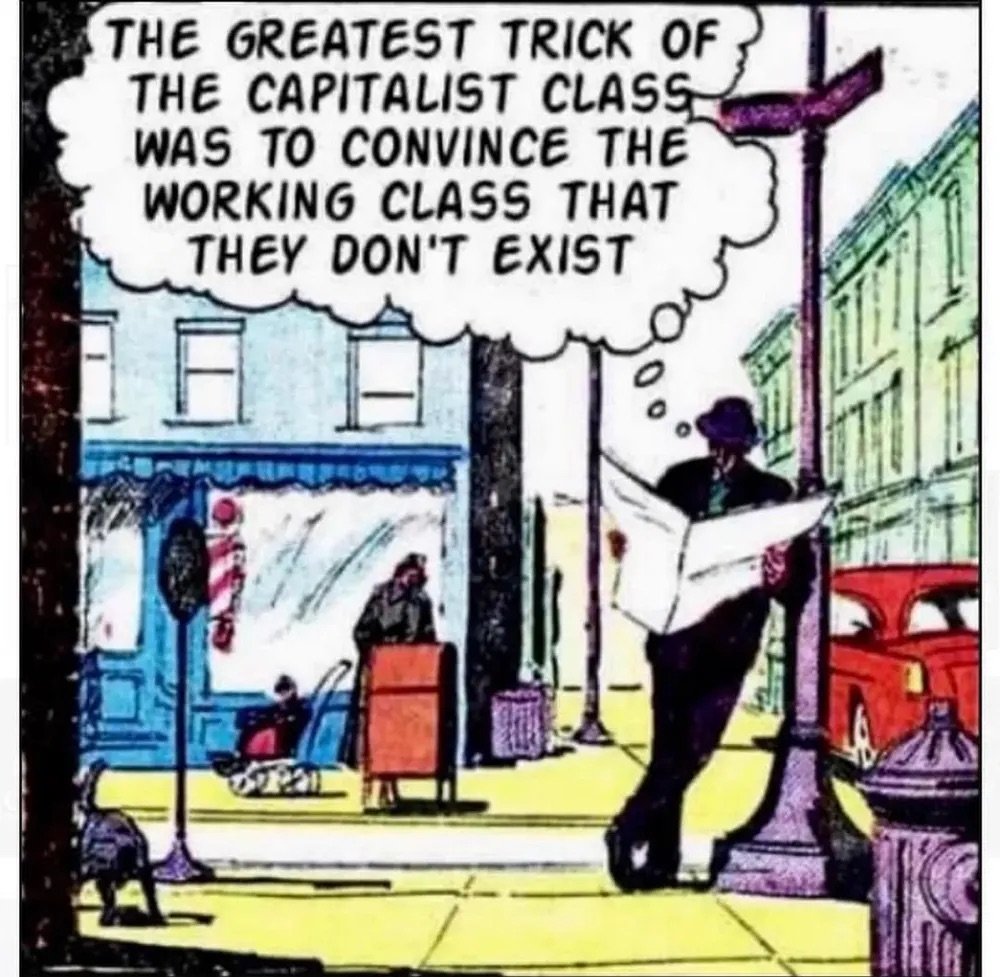
Most Argentinians, including various new members of the 57% below the poverty line (early February 2024) self-identify as middle class. Whether you’re a shoeshine in the Buenos Aires banking district, a rural peon, a corporate CEO or a major shareholder, or if your family own hundreds of thousands of hectares of productive land in the Pampa (or a million or so in Patagonia) you’re no different to anyone else; you’re just soundly middle class, a regular person. This comforting myth serves as camouflage for the clase dirigente helping to divert anger away from them. Milei always blames politicians; his ‘casta‘ never the clase dirigente.
In Milei’s first month another 6% of the Argentine population plunged below the poverty line due to his economic shock therapy. Anger redirection needed to spring into overdrive. The argument repeated by Milei is: “It’s not the rich that are the problem it’s the State!” but now he is the state so he refined the deflection of anger. It is not the LLA (or the PRO political parties) it’s the hated Peronists or the traitor UCR. It’s not the presidency that’s the problem, it’s the legislature or the provincial governors. It’s not me, it’s you!
As members of the middle classes it’s OK for the rich to instill public hatred for corruption in the political caste or hatred of the supposedly inefficient state, managed, the argument goes, by politicians for their own benefit. This camouflage has the fabulous advantage of completely absolving the private sector, even though it is their companies who pay the bribes for state contracts that corrupted the casta in the first place. An Argentine clase dirigente may become a judge but they rarely lower themselves to work as professional politicians. Mauricio Macri is one exception that proves the rule. They prefer to distance themselves from such filthy business, to use the political casta to do their dirty work for them.
Argentina has a highly unequal distribution of wealth. The nation scored 42.3 on the Gini co-efficient scale in 2021 (with 57% below the poverty line, the GINI coefficient is closer to 50 now). In 2021 Argentina sat between the Philippines and the Democratic Republic of Congo, so, Milei’s claims that previous governments were ‘socialist’ does not hold water. Peronism, the most popular of Argentina’s curious political parties is not communism, it is an adaptation of social democrat with nationalist conservative tendencies.
Many workers in Argentina’s expanding working class work partially or completely off the books and the tax registers in the informal economy and a lot of them live in social housing or informal slums (locally called villas miseria). Curiously these villas are often quite close to gated communities (locally called countries) like the famous Nordelta where the upper classes (disguised as middle classes of course) hang out with drug traffickers their privacy and wealth protected by walls and electrified fences on private roads with private security.
As to Milei himself, seems to be genuinely middle class, and, at least at the outset of his presidency, Milei does seem to be genuine in his anti-corruption zeal which, in Argentina, is quite refreshing. This zeal may put him on a collision course with the Macri family. Milei has created alliances with his hated political caste but their policies are not 100% aligned. Radical downsizing of government spending and monetary policy is not PRO policy, the LLA is liberal the PRO neoliberal.
It is always about less tax
Argentina, like many Latin America nations, has a super-presidential democratic system. Super-presidents actively push new laws and attempt to strike out old laws. Milei began his presidency with extreme vigour in this regard. Tax, labour and trade laws have direct effects on the business interests of the rich, and reflect on their power relationships with employees. Tax rates affect profit margins as well as the owner’s patrimony when dividends are paid out on shares that they own or when shares are sold for a profit. Tax matters most to the owners of capital economic and fiscal policy changes cannot be left to chance. Corporations, both local and transnational corporations are happy to spend a little corporate cash on think-tanks with their tax interests in mind. This provide access which can pay off big time (see the list at the end of this article for details).
The COVID-19 pandemic in Argentina forced the previous Peronist government to impose a small, once-off, wealth tax, causing eruptions in Argentina’s invisible upper classes. Milei had already been targeted by tax lobbying groups even before the PRO troll farms went into overdrive to push its voters to support Milei when their candidate Patricia Bullrich was eliminated. Milei the presidential candidate enthusiastically jumped on the anti-tax bandwagon with missionary zeal signing a document live on television saying he would never raise taxes saying this in front of “God and the Nation!“. Milei’s brand of paleo-liberalism considers taxation to be stealing from the pockets of entrepreneurs. He vowed to cut his own arm off before raising taxes. When he came into power Milei soon realized that the taxes needed to stay, in fact he even raised grain export taxes to balance the budget. He simply ignored his pledge, raised the taxes, and he still has both of his arms.
When it comes to investment, property rights and (strangely for a liberal president) also subsidies, Milei has played well with local export-focussed capital and, judging from his extensive travel schedule, Israeli and US corporations could find even more favour in the mining, water management and agro-industrial sectors, to mention but a few. For a time Milei was popular with their taxation lobbyists too. Milei tried hard to drive through legislative changes over congress which one suspects, were largely written by lobbying lawyers in those sectors themselves. However local manufacturers who rely on local markets and their sales outlets are less happy. Milei has been very illiberal in maintaining protectionist import duties (that protect them from international competition) and he’s tried to adjust legislation in their favour but the severe economic adjustment has stalled the economy.
When Milei’s mega-laws and DNU’s got stuck in legislative commissions ‘Toto’ Caputo, Milei’s dark lord of the economy, separated out all new taxes policy from any new legislation in an attempt to allow deputies from grain exporting provinces to vote with the government. In the end it did not work. Milei’s greedy DNU’s and mega-laws were recalled when negotiations in the legislature fell apart but, again, taxes matter.
The policies that matter to the upper classes and their think-tanks
Apart from the ever present bugbear of taxation, labour law for employers is also key, as are wage levels defined by minimum wage laws etc… Even the currency in which wages (and taxes) are paid can make a difference and so legislation in this area is something of major interest to the clase dirigente. Argentina’s labour laws, enhanced when Juan and Evita Peron unified interests with labour unions, are relatively strict and penalties can be high (albeit in devaluing pesos). This means employers often lose in labour courts, so if Milei could remove this labour protection altogether, problem solved! He tried, it was thrown out of court.
Tax laws, labour laws, tort laws and even laws on corruption can be key to a company’s success or failure. Subsidies and government contracts can also be very lucrative and access to politicians, to rewrite policy legislation (and access to lawyers and judges) who interpret these policies in courts is all highly relevant. Kind of like having a friend who works as a bank manager in a Swiss private bank.
Apart from paying dodgy accounting firms to move money where local tax authorities can’t find it (a major sport in Argentina as the Panama papers revealed) the super-rich are all about proactive measures to influence policy and elections. This often involves deep pockets for publishing, teaching and advocating in court of public opinion (even buying newspapers) to develop political power through think-tanks, private economics faculties and, of course, election campaigns not to mention other darker mechanisms still.
Even investing in a think-tank which promotes somewhat absurd, libertarian economic theories, might pay off big time. Academia in South America operates on a shoe-string budget. It can be difficult to refuse an invitation to a conference when your salary will never allow you to take a trip like that otherwise. Academics with shallow purse-strings might write a paper for a “conference” even on a very marginal economic theory like libertarianism, tempted by an all-expenses-paid trip where the rum and champagne flows by the beach. Like doctors getting invited to an all expenses paid ‘conference’ on a Caribbean island by a pharmaceutical company just a bit more boring.
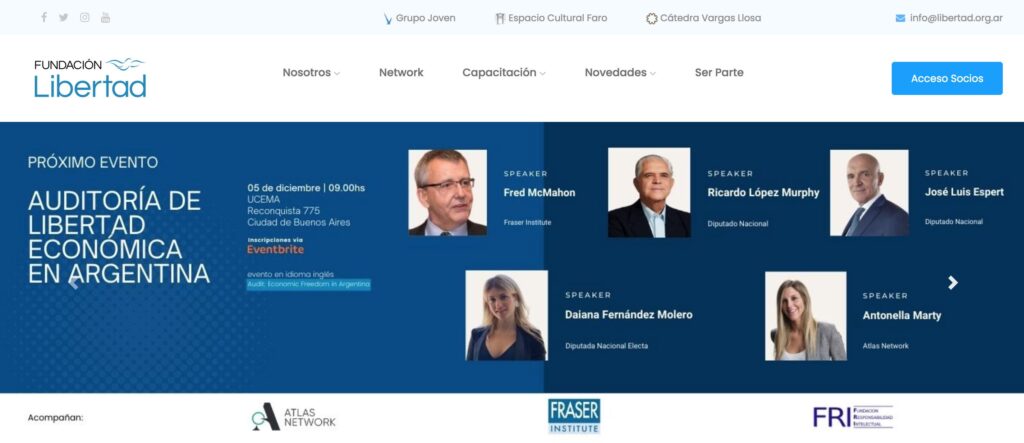
Both Espert and Lopéz Murphy lecture on Liberalism at Fundación Libertad
and Esbert teaches in UCEMA
Also there might be a job offer too, if your paper promotes ultraliberalism. Maybe teaching in a private university like the UCEMA in Buenos Aires where Milei’s pseudo-academic libertarians hang out with Milei’s mates like the Benegas-Lynch family (who have been selling liberalism in Argentina for three generations and were active in his campaign and in trying to push through Milei’s legislation package after he won). At UCEMA you’ll also find the proto-fascist deputy José Luis Espert. Espert even invented his own libertarian party. It did not do too well in the elections so he decided to ally with LLA.
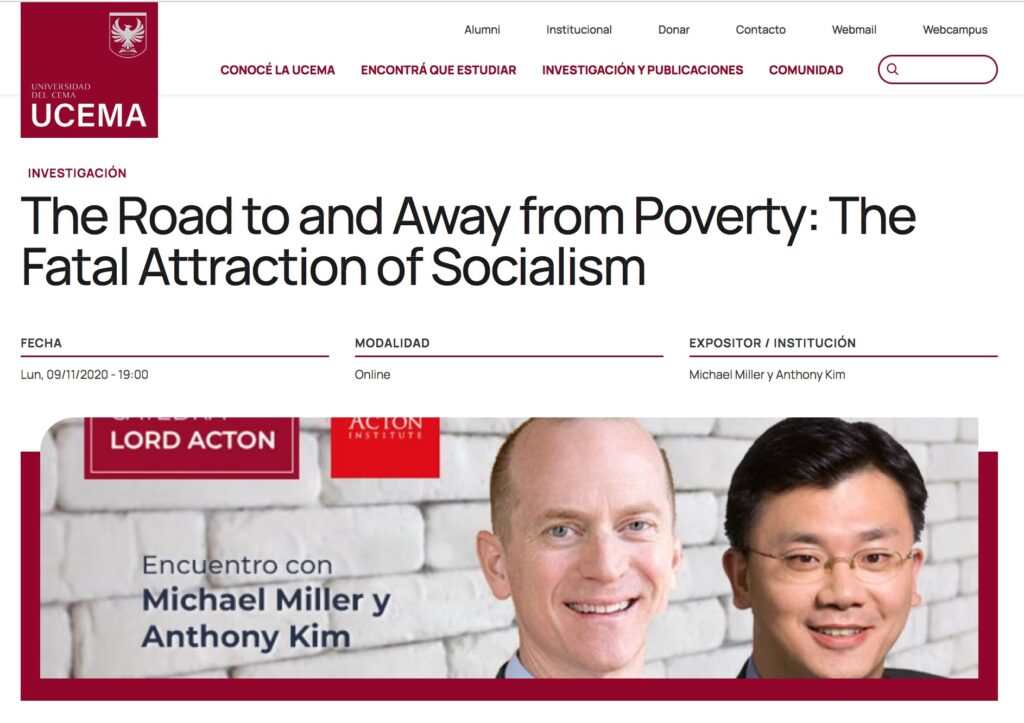
The next section takes a look at the network of libertarian think-tanks and the companies that fund them, a network that has been extraordinarily successful in Argentina, the Atlas Foundation and their mini-me‘s in Latin America.
Think Tanks selling Policies and Winning Elections
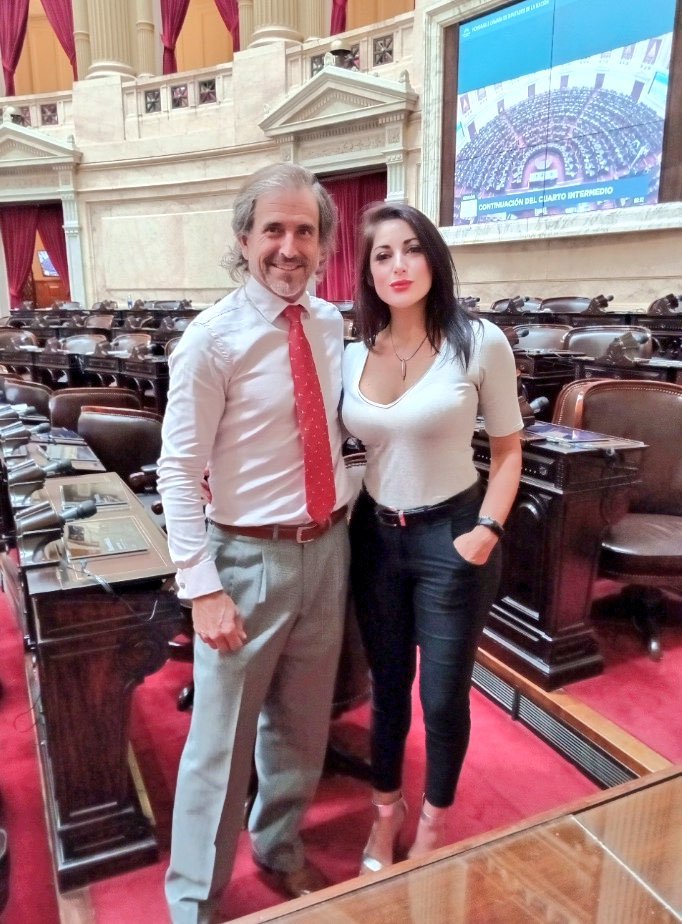
“Think-tanks are understood as institutions with murky boundaries that ‘juggle with’ a diverse array of capitals pertaining to four fields (academia, politics, media and the economy), performing a ‘balancing act’ between heterogeneous aims and resources (e.g. academic credentials, political power, media presence, economic assets). Therefore, think tanks are often somewhere between being a research centre, an advocacy group, a media agency and lobbyists, without ever becoming only one of those things in particular.”
Source: On Think-Tanks
If you can get people to believe that low taxes or less workers rights are a good idea then maybe you can also dress up those ideas as a morally correct (libertarian) economic theory and start to invite a bunch of academics and press people to conferences to spread your ideas as a viable economic theory (especially when the neoliberal economy is in crisis already).
Even better, offer a few fervent believers teaching jobs in your private economics faculty or have a few influential people speak to newspaper editors to introduce “experts” from your own think-tanks to maybe write an Op-Ed for the upcoming elections. If you can get these published then broadcast these to the public via social media campaigns (pushed by your own paid algorithms) then maybe think-tank ideas might influence the vote when candidates talk in tongues using your think-tank’s ideas. Social media works can be very effective at influencing the opinion of the masses, especially the young, and in a similar manner lecturers can be hired to teach these libertarian ideas to their students in private economics faculties.
If you can pull that off then all you need is to find is a popular (and maybe also a populist) fanatical presidential candidate, preferably one that actually believes your doctrine! That way, if they win of course, they’ll try to lower your taxes, cut labour laws etc…
Sound like a plan?
Honestly to me this sound like some crazy conspiracy theory and I wrote it. I mean doesn’t it sound a little crazy to think that you can make up ideas, invent think-tanks to sell those ideas and hire lousy professors to teach them, and even create politicians that convince others they believe these theories after reading a few books by Murray Rothbard, never mind them actually winning elections to apply these ideas. Sounds preposterous. Pie in the sky? In Argentina anything is possible.
Let’s take a look at the facts.

The current CEO of the Atlas Network is Brad Lips. That’s him in the blue jacket, white Midwestern smile, no tie. Atlas is the main umbrella group for libertarian friendly extremist economics climate change denying think-tanks like CATO or the Heritage Foundation. Atlas is a major part of the curiously US phenomenon the “rebellion of the right“. Now also available in Argentina!
Brad also incidentally works at the Mont Pelerin Society, it’s a small world in the right wing think-tanks. At Mont Pelerin Hayek invented neoliberalism (from liberalism) beginning in 1947. Frederick Hayek organized the first Mont Pelerin meeting at the society’s foundation in Switzerland. Think of Mont Pelerin as a proto Think-Tank or the mother of all think tanks. Brad chaired Mont Pelerin’s 2016 organizing committee and currently chairs the Mont Pelerin Membership Committee ⏤ membership at Mont Pelerin is by invite only.
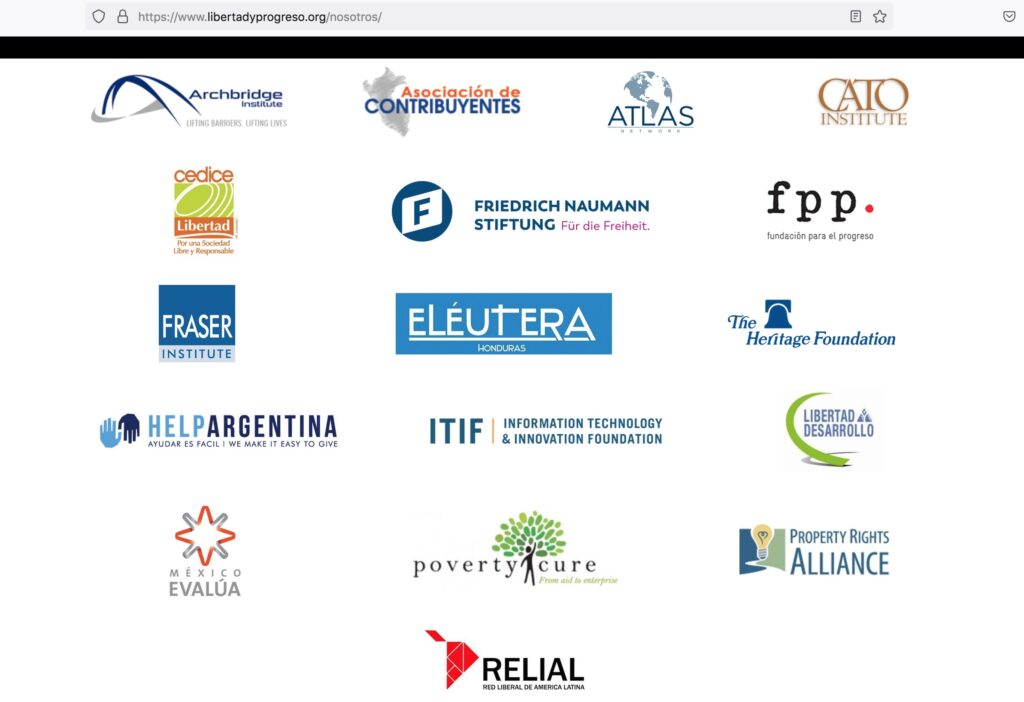
Libertad Y Progreso’s Buenos Aires Liberal Think-tank and their allies
Brad, writing on the Atlas Network site about Javier Milei, began with a broad brush attempt to describe the economic decline leading up to the elections. There were extraordinary factors like the pandemic, and a drought, driven by climate change, wiping out much of the export soybean crop and forcing the premature slaughter of millions of cattle. Brad, however, focused on corruption in the last two governing parties (who happened to be the Peronists and the PRO but he didn’t name names) which, he argued had left the Argentine economy in rags. Here are are a few highlights:
In these dire circumstances, it’s no wonder an outsider with new ideas has captured the hearts of voters. The economist Milton Friedman [who took over from Frederick Hayek as the main Chicago Boy] once observed that major policy changes tend to happen only during a crisis, and that “the actions that are taken depend on the ideas that are lying around.” We can credit Argentina’s civil society for leaving the right ideas where someone would find them.
Source: The Hill and The Atlas Network
Poor Brad couldn’t help himself. I mean think of how delighted he must have felt. In three days Milei might become the world’s first liberal president. Of course he should have kept his mouth shut but he ran a network of liberal think tanks, think tanks that had tried for decades to sell obscure stale economic ideas (never before put in practice for more than 100 years) then along comes Milei (dropping like a force from the skies) and he was just then so close to power. Brad has donors to impress, and, like all of us he has an ego.
These ‘ideas‘ Brad speaks of, were not left innocently “lying around” by just anybody. Brad published this article just three days before Milei’s election and Milei, as it turned out, was elected president in Argentina after a few frenzied months of electoral campaigns. The “civil society” that Brad cites includes the local think-tanks in the South American Atlas Network, funded and promoted by Brad’s own think tank to promote libertarian policies in South America. The locals were co-ordinated by RELIAL and included Fundación Libertad. Fundación Libertad’s (libertad.org.ar) site was taken down after the election but the think-tank was actively promoted and subsidized by Atlas. Fundación Libertad is not exactly well known in Argentina but it is listed by Brad in in his original Op-Ed in the Washington DC Insider political rag: “The Hill”. Here is what he said:
Think tanks such as the Rosario-based Fundación Libertad and scholars like Professor Alberto Benegas Lynch have spent decades explaining the advantages of market exchange, compared to the statism that has long dominated Argentina. Another public policy institute in Buenos Aires, Libertad y Progreso, has worked tirelessly to educate the public about the dangers of expansive government, proposing practical, feasible reforms to reduce duplicative government agencies and burdensome regulation.
(Ibid, link added)
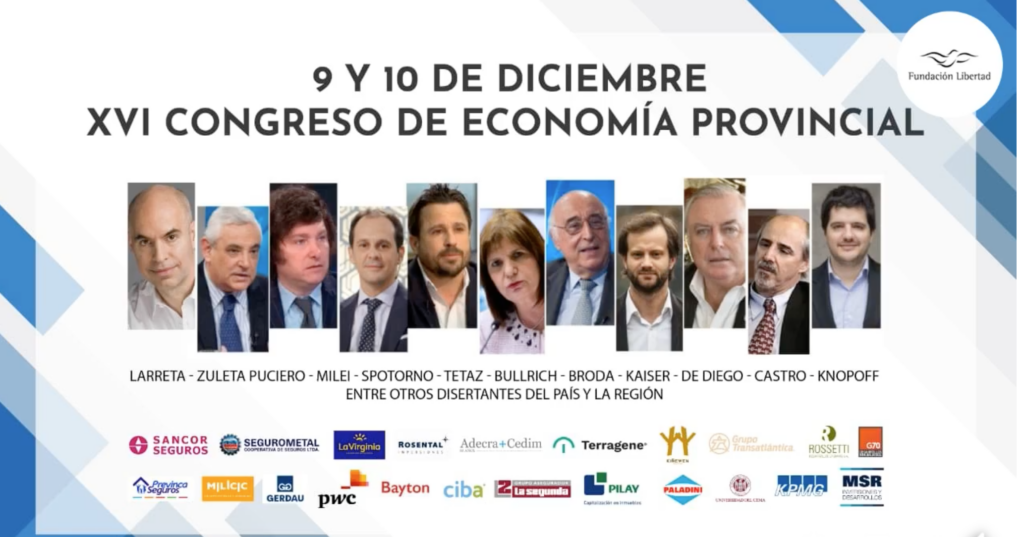
Politicians more often use crises to restrict the Overton Window [Milei’s own “no hay plata” is a classic], while proposing ever-larger government interventions. This moment of hope in Argentina shows us the other side of that coin — that in times of crisis, the Overton Window can shift dramatically in favor of freedom.
(Ibid)
If there was anything that opened the Overton Window to Javier Milei it was think-tanks like Fundación Libertad, RELIAL and the Atlas Foundation. For the funders of these think-tanks President Milei could mean payback time both for international Atlas funders and their local companies in Argentina that have given so generously.
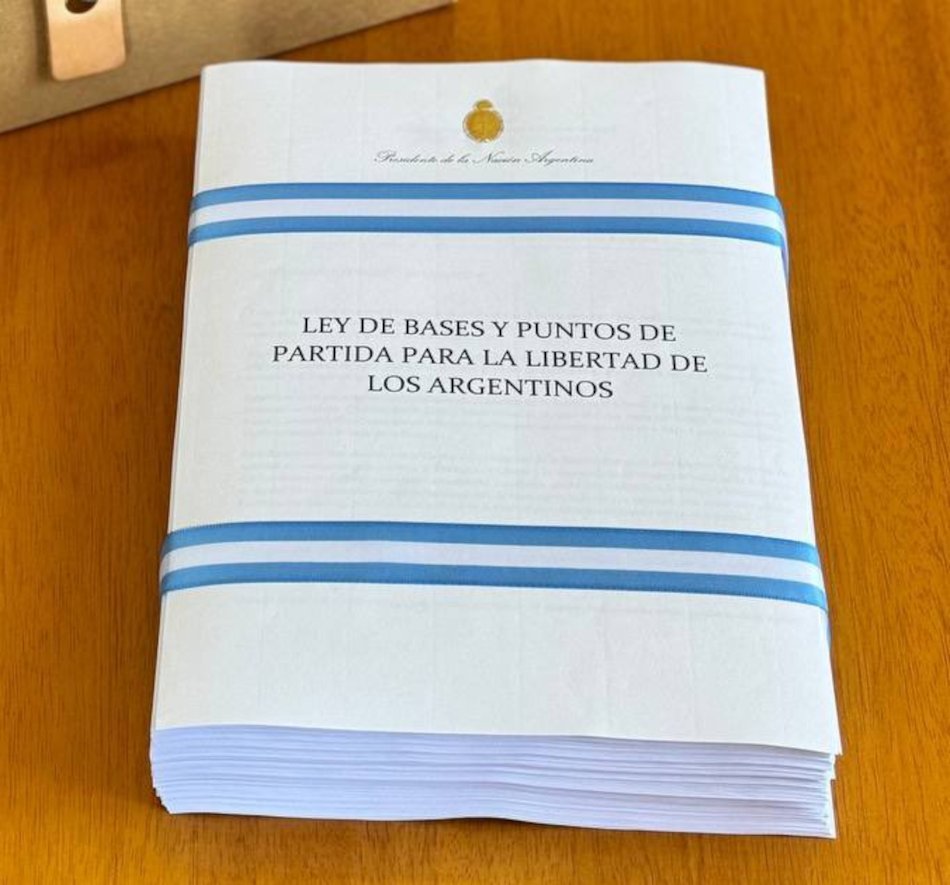
Maybe supporters might even be able to share ideas with the new president in the form of tailored legislative transformations which might have been lying around for years waiting for the right government to come along. Milei magically had 600 or so urgent laws to push through, some of which Mauricio Macri’s PRO had tried to get through years before. Maybe they could get through congress this time? Though this did not work, one does have to ask who were the corporate lawyers that wrote 600 laws and did they maybe use outlines promoted by “experts” from think-tanks. Take that legislation out of the old office drawer, dust it off, and pass it on to Milei for one of his mega laws. What can go wrong? I mean Milei actually believes in liberalism, he worships the private sector and we know what we want so why not tell him? Tell Milei that all will be more than repaid to society through high-paid jobs and economic stability. But that comes later. And, if it turns out that there are less jobs or there are actually lower wages, even better, more competitive, more profits for us! Who will remember what candidates promised anyway. Trickle down, a rising tide lifts all boats and all that lark. It may never have worked and it won’t work now in Argentina either but it is a good story. So what if the practice turns out to be somewhat different to the theory, by the time the practice is understood your profits are already off-shored.
What all of these think tanks have in common is they advocate for lower taxation on the rich, market freedom and flexible labour laws. This means freedom for capital from labour rights and from taxation on profits made by private capital which might be used for “social programmes” like public transport, public hospitals etc… The source of these ideas are a global family of think-tanks concentrated in Latin America but many dependent on US funding like the Atlas Foundation and the Atlas Network.
These think-tanks are happy to provide questionable source texts and ‘experts’ along with seed funding and a pseudo-academic private university promoting the creation of local clone think-tanks (often set up by a local Austrian school professional think-tank operatives like Alejando Chaufen) inviting ‘experts’ like Fred McMahon from the Fraser Institute in Canada who came to speak at the end of the year celebration in Buenos Aires in the first week of January 2024 in Buenos Aires for Fundación Libertad.
Fundación Libertad was once a more neoliberal think-tank but is now adapting to the new political reality. Mauricio Macri still attends main events and just a quick look at the sponsoring members (archived link) shows a who’s who of many local big players. If you are looking for what helped shape the group-think that elected Javier Milei in Argentina, the think-tanks are important. Fundación Libertad has a large sponsor list in the private sector for them. Whether these companies knew what they were supporting or not they were listed as corporate sponsors in 2023 on the (now defunct) Fundación Libertad Website. They also supported Mauricio Macri’s PRO party and the JxC coalition in general till they were eliminated in the elections, now they have both.
- Aceros Coco, Aceros Cufer SRL, Acto Médico SA, Adecco Argentina S.A., Adrian Giaganti SRL, AL SERVICIOS INTEGRALES SA, Asociación Mutual SanCor, Avalian
- Banco Hipotecario, Bauducco, Bayton Group, Berkley International, Binder DF, Blindaje Seguridad, Bolsa de Comercio de Rosario
- Cabanellas & Compañía, Cablehogar, Caden SRL, Carat Apart Boutique, Cargill SA, Causer SA, CDS Sistemas, CIBA, Conectar, Cooperación Mutual Patronal, Crestale Propiedades, Cruz Azul Salud, Cyberanalytics SA
- David Rosental e Hijos, Don Osvaldo SA
- ECCO, El Abuelo / Global Lottery, Elias Yapur SA
- FAENI, Farmashop, Felcaro, Roldan & Asociados, Fundación Coinag
- Gases Sudamericanos SA, GEA Desarrollos, GESINT, Grimaldi Grassi, Grupo Emerger, Grupo Gamma, Grupo Oroño, Grupo Roma HSBC
- Inalpa SA, Industrias Mengarelli, Intagro
- John Deere, Juan Navarro e hijos
- KPMG
- La Segunda, La Virginia, Leiva Hermanos, Lisicki Litvin Asociados, Litoral Gas, Long Automotores, Luis Lamelas, Luxor Gas, Luzzi Diseño
- MATBA/ROFEX, Medicina Esencial, Mercado Argentino de Valores, MG Group, Mignani SRL, Milicic, MSR Constructora, Multishop Red Naranja X
- NCA, Nuevo Central Argentino, Neostar, NZR
- Obring, OSDE
- Paladini, Plenit Medicina Prepaga, Previnca Seguros, PwC – Price Waterhouse Coopers
- Razzini Materiales, RE/MAX, Rinaldi Construcciones, ROSFAR, Rossetti SA, ROSTRIP
- San Cristóbal Seguros, Sanatorio de la Mujer, Sanatorio Mapaci, Sanatorio Neuropatico, Sanatorio Parque, Sancor Seguros, Segurometal, Seprio SA, SIDERSA SA, SIPAR Aceros / Gerdau, Sushiclub
- Terragene, Transatlántica Bursátil, Transdatos SA
- Ubiar
[1] The Atlas foundation is named after the novel Atlas Shrugged by Russian writer Ayn Rand. Popular among economists on the right including Alan Greenspan who used to hang out in Ayn Rand’s flat in New York. Atlas Shrugged tells the story of suffering railway and steel business owners and their battles against a mysterious figure John Galt. Galt calls strikes among creatives and engineers for a new non-collectivist future finally planning a new capitalism based on his philosophy. For more on the influence of Atlas Shrugged on Libertarianism and F.A.Hayek you could read the following essay from the horse’s mouth.

The Atlas network / A Neoliberal think-tanks, by Anthony Fisher. UK Labour wins the election after the war then wants to become a Tory politician. Fisher met Hayek had written the book The Road to Serfdom. Warns about too much reliance on govt. promoting the private section. Fisher say you need to engage in the war of ideas because public support for ideas so create different ideas in the IEA in the UK. Fisher meets oil companies then they give money but this is considered hidden and this gains traction — bringing Thatcher to the UK. Gets invited to start new think-tanks including the Fraser Institute then he meets the Koch brothers… Mostly oil and mining and the Murdochs, Tar-Sands in Canada and then he creates the Atlas Network in 1981 and immediately focus the South America, getting Bolsonaro elected … (big swing to the right in 1980’s and 1990’s) (Adam Smith Institute too)
Increased criminalisation in climate protests!
https://youtu.be/-zzwYlljwIQ?t=1347
Haven’t gotten through the whole piece yet – but as things come to mind in relation to points mentioned – the targeting by Milei of the political class he calls la casta – its typical of right wing populism the “Establishment” is among the Enemy – populism requires an Enemy to blame for the as the culprit of the “People’s” suffering. Note for example Trump referred to DC as a “swamp”. True to populist discourse the key terms are always very generalized and somewhat ambiguous never being precisely defined. True to comment about the clase dirigente – he never specifically targeted what I call la Aristocracia Política – the Political Aristocracy – as its where the contacts with Big Business lie and he wants in on the Club.
Actually its quite interesting that recently he reiterated his view that the State is a criminal organization – and being President obviously means he’s the head of said criminal organization 🤣🤣